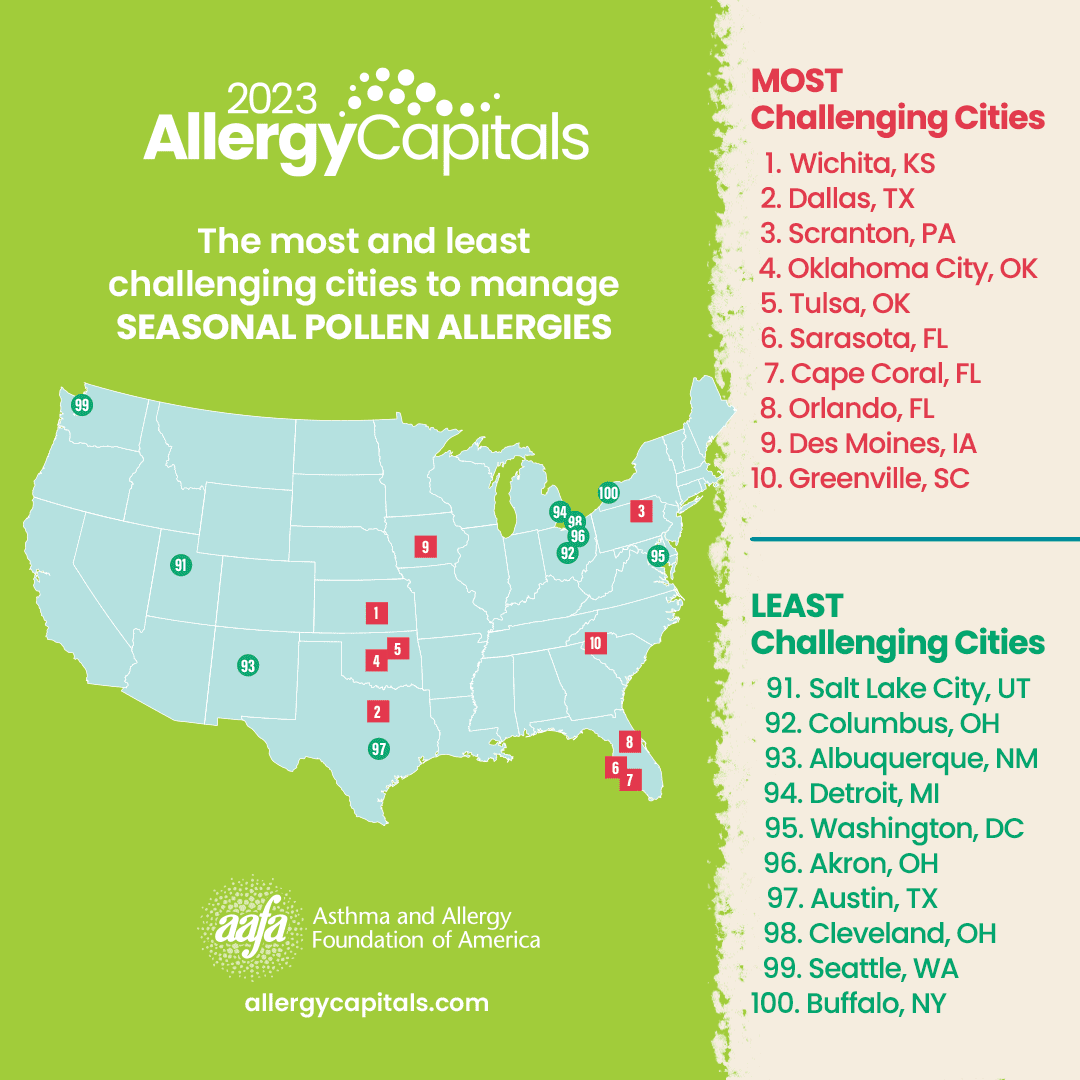As we prepare for spring, the Asthma and Allergy Foundation of America’s (AAFA) has released our 2023 Allergy Capitals™ report.
AAFA’s report ranks the top 100 most challenging cities in the continental United States to live with seasonal pollen allergies. The report includes data from the previous year to create a ranking of the 100 most populated cities based on:
- Tree, grass, and weed pollen scores
- Over-the-counter allergy medicine use
- Availability of board-certified allergists/immunologists
The top 10 most challenging cities to live in with seasonal allergies in 2023 are:
- Wichita, Kansas
- Dallas, Texas
- Scranton, Pennsylvania
- Oklahoma City, Oklahoma
- Tulsa, Oklahoma
- Sarasota, Florida
- Cape Coral, Florida
- Orlando, Florida
- Des Moines, Iowa
- Greenville, South Carolina
This year’s report also highlights three topics related to seasonal allergies:
- Self-care for seasonal allergies
- Climate change and worsening pollen seasons
- The importance of pollen sensors across the United States
- Climate change and worsening pollen seasons
- Self-care for seasonal allergies
People with asthma and allergies should be able to find relief no matter where they live. AAFA releases this report each year to help you manage your seasonal allergies. With proper diagnosis, the right treatment, and by reducing contact with pollen, you can feel better and improve your quality of life.
“Managing pollen allergies is possible,” says Dr. Neeta Ogden, allergist and spokesperson for AAFA. “While it is best to avoid pollen allergy triggers, that may not always be possible, as this report makes clear. Working with a specialist can offer you solutions to improve your quality of life. It is important to consult with your allergist about your symptoms so you can devise a treatment plan that best helps you manage them. Allergy testing is also a way to better understand your allergy triggers and, therefore, better manage them.”
Symptoms of Seasonal Allergies
Seasonal allergies are known as seasonal allergic rhinitis. You may have heard it called “hay fever.” Seasonal allergies can cause symptoms during the times of year when pollen counts are high. This is usually in the early spring, during the late summer, and early fall. Some states even have pollen year-round now.
The symptoms of seasonal allergic rhinitis are:
- Sneezing
- Stuffy nose (due to blockage or nasal congestion)
- Runny nose (also known as rhinorrhea – usually a thin, clear discharge)
- Red and watery eyes
- Itchy nose, eyes, ears, or mouth
- Swelling around the eyes
Practice Self-Care for Seasonal Allergies
If you think you have seasonal allergies, see a board-certified allergist to confirm your allergies and help you come up with a plan to manage them.
You can manage your allergy symptoms with self-care and an allergy treatment plan. Now more than ever there are a number of available and accessible options to help you find relief. Follow these steps outlined in our report to practice self-care:
- Manage your contact with pollen
- Take allergy medicine
- Rinse out your nose
- Ask your doctor about immunotherapy
See the 2023 Allergy Capitals report for more information on how these steps can help you manage your seasonal allergy symptoms. Talk with your doctor about which allergy treatments are right for you.
SPRING ALLERGY TIP: Keep your windows closed and remove your shoes before entering your home to cut down how much pollen gets inside your home. More pollen allergy tips available at allergycapitals.com from @aafanational
The 2023 Allergy Capitals report is an independent research project of AAFA and is made possible by a research support grant from the Consumer Healthcare Products Association.
How Can I Learn More About the Report?
The Allergy Capitals™ ranking is an annual research and education project from AAFA. We release the report to help people recognize, prevent, and safely treat allergy symptoms. Through this ranking, AAFA raises awareness about the impact of seasonal allergies. It provides helpful information that can improve the quality of life for people living with seasonal allergies.
Visit allergycapitals.com to see the full list and to learn more about allergy diagnosis, prevention, and treatment.
Join our online community where you can get support for asthma and allergies and stay up to date on news and research.


Comments (0)